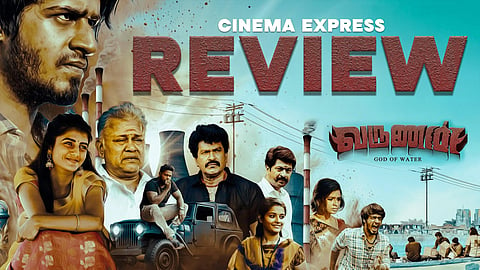Varunan Movie Review: Shoddy writing waters down a promising premise
Varunan(1.5 / 5)
Varunan opens by contrasting humanity's historical reverence for the five essential elements with the modern-day exploitation of these resources, particularly water. The potential for a compelling exploration of this water conflict within the unique setting of Royapuram quickly dissipates as the narrative falters.
Ayyavu (Radharavi) runs a water plant in Royapuram and also manages a water supply agency. His rival, John (Charanraj), too runs a water supply business but stands a notch below Ayyavu, as his agency relies on Ayyavu’s plant for refills. Both agree on certain terms, including the division of areas where their respective agencies can supply water cans. Varunan is about how ambitious individuals around them spark a water war.
The biggest problem with Varunan is not predictability but the weak scenes that lead to predictable outcomes. We are told right at the beginning that Ayyavu and John are likely to lock horns in a territorial battle. However, till the very last scene, both remain cordial to each other, constantly chiding the men on their respective sides who attempt to stir friction between the two agencies. Before the narrative comes to a standstill—as neither of the two main players is inclined to act nastily toward the other—we are introduced to Thillai (Dushyanth Jayaprakash) from Ayyavu’s camp and Dabba (Shankarnag Vijayan), John’s brother-in-law. These two face off for the most trivial reasons imaginable. For instance, in an artificial and overly dramatic scene, Dabba insults the water can delivery profession, a job he himself relies on, and Thillai, who reveres water cans in his pooja room, takes offence. Thillai takes his thozhil bakthi and ayudha pooja too seriously, where a simple line like "andha can dhaan da namakku soru poduthu" would have hammered the point home far more effectively.
Dabba harbours hopes of leading a rich life by selling illicit arrack (sundakanji), using the water can business as a front, with the support of his sister Raani (Maheshwari), much to John's dismay. Director Jaayavelmurugun fails to capitalise on the avarice of these characters to heighten the tension in the plot. Instead of leveraging Dabba and Raani's greed to drive the conflict, their subplot stagnates, becoming an insignificant cycle of illicit business and ineffectual reprimands from John. The narrative attempts to depict John as the power centre, but weak writing fails to establish this. The rivalry and territorial tussle fade into a haze, with no clarity on who holds authority and makes decisions within John's team—the supposed aggressors—while Ayyavu's camp remains pacifist. The film's visual language, including gratuitous cowboy-style shots and repetitive close-ups, fails to elevate the narrative, and Ayyavu remains a static figure, his supposed 'big shot' status undermined by his passive role.
Cast: Radharavi, Charanraj, Dushyanth Jayaprakash, Gabriella, Shankarnag Vijayan
Director: Jaayavelmurugun
Jiva Ravi’s Maduraiveeran is yet another opportunity gone to waste. He plays a seemingly tough cop waiting for the right moment to reveal his true colours. However, we are never told why he opposes John, tries to befriend Ayyavu, or ends up paying Raani instead of taking a maamul to allow her to continue her shady dealings. With no concrete motives for his actions, Jiva merely goes through the motions as Maduraiveeran, delivering a mechanical performance.
Adding to this already dreary concoction are the romantic tracks involving Thillai and Sittu (Gabriella), and Marudhu (Priyadharsan) and Agni (Haripriya). These subplots leave us scrambling for some charm or cutesy moments—all in vain. The dialogues, too, are not the film’s strongest suit. Although Varunan is set in Royapuram, the use of 'sappa' acts merely as a token for Chennai Tamil, just as 'ley' signifies Nellai slang, and 'di' prefixes add little authenticity or flavour to the Madurai dialect.
Varunan ends up as a bundle of missed opportunities. The only time John and Ayyavu's teams get into a proper scuffle is after Agni’s death—a moment that could have been meaningful, since 'fire' gets doused by 'water,' symbolising people fighting over water. Yet, such moments of brilliance or singular ideas are few and far between in a film that struggles to be enjoyable.
Varunan begins on an alarming note about the commodification of water, only to settle into a routine territorial conflict story set in a slightly different milieu. Offering neither a valuable message on the water crisis nor an engaging gang rivalry, the film ultimately fails to quench our thirst for good storytelling.

